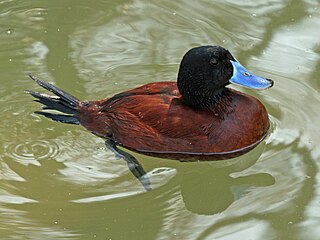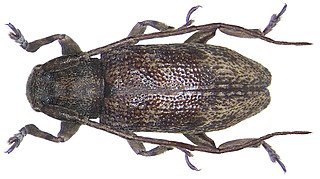
A grison, also known as a South American wolverine, is any mustelid in the genus Galictis. Native to Central and South America, the genus contains two extant species: the greater grison, which is found widely in South America, through Central America to southern Mexico; and the lesser grison, which is restricted to the southern half of South America.

The greater grison, is a species of mustelid native to Southern Mexico, Central America, and South America.

The lake duck is a small, South American stiff-tailed duck. It is also called the Argentine blue-bill, Argentine blue-billed duck, Argentine lake duck, or Argentine ruddy duck.

The dusky robin is a small passerine bird native to Tasmania. A member of the Australian robin family Petroicidae, it is not related to robins of Europe and North America. It is a brown-plumaged bird of open woodland.

Pteris vittata, commonly known variously as the Chinese brake, Chinese ladder brake, or simply ladder brake, is a fern species in the Pteridoideae subfamily of the Pteridaceae. It is indigenous to Asia, southern Europe, tropical Africa and Australia. The type specimen was collected in China by Pehr Osbeck.

Ropica Górna is a village in the administrative district of Gmina Sękowa, within Gorlice County, Lesser Poland Voivodeship, in southern Poland, close to the border with Slovakia. It lies approximately 4 kilometres (2 mi) east of Sękowa, 9 km (6 mi) south-east of Gorlice, and 108 km (67 mi) south-east of the regional capital Kraków.

Ropica is a genus of beetles in the family Cerambycidae, containing the following species:
Ropica papuana is a species of beetle in the family Cerambycidae. It was described by Breuning in 1939.
Ropica pseudosignata is a species of beetle in the family Cerambycidae. It was described by Breuning in 1939.
Ropica fuscobiplagiatipennis is a species of beetle in the family Cerambycidae. It was described by Breuning in 1964.
Ropica keyensis is a species of beetle in the family Cerambycidae. It was described by Breuning in 1953.
Ropica sechellarum is a species of beetle in the family Cerambycidae. It was described by Breuning in 1957. It contains the subspecies Ropica sechellarum interruptefasciata and Ropica sechellarum sechellarum.
Ropica cunicularis is a species of beetle in the family Cerambycidae. It was described by Pascoe in 1865.
Ropica fuscicollis is a species of beetle in the family Cerambycidae. It was described by Pascoe in 1865.

Ropica indigna is a species of beetle in the family Cerambycidae. It was described by Pascoe in 1865.
Ropica squamosa is a species of beetle in the family Cerambycidae. It was described by Newman in 1842.
Ropica duboisi is a species of beetle in the family Cerambycidae. It was described by Fairmaire in 1850.
Ropica formosana is a species of beetle in the family Cerambycidae. It was described by Henry Walter Bates in 1866. It contains four subspecies, Ropica formosana formosana, Ropica formosana japonica, Ropica formosana nobuoi, and Ropica formosana tokaraensis.

Hakea vittata, commonly known as the striped hakea, hooked needlewood, is a shrub of the family Proteaceae. Restricted to an area on the Eyre Peninsula and the Gawler Range in South Australia and small areas in eastern Victoria.







